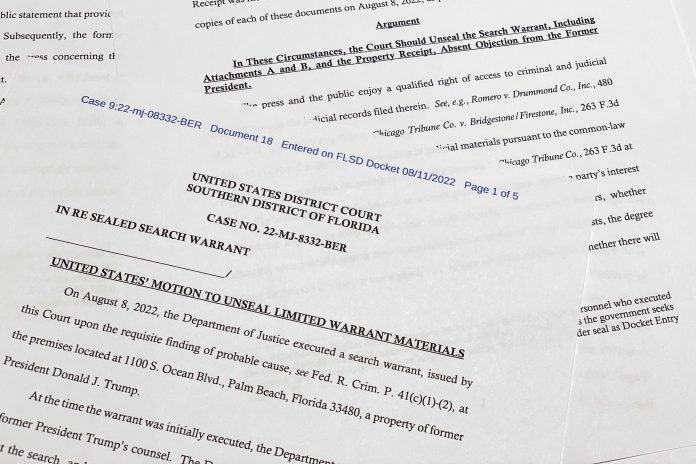
By ERIC TUCKER and MICHAEL BALSAMO
Associated Press
WASHINGTON (AP) — The Justice Department is asking a federal court to unseal the warrant the FBI used to search the Mar-a-Lago estate of former President Donald Trump, Attorney General Merrick Garland said Thursday, acknowledging extraordinary public interest in the case about classified records.
The request is striking because such documents traditionally remain sealed during a pending investigation. But the Justice Department appeared to recognize that its silence since the search had created a vacuum for bitter verbal attacks by Trump and his allies and Garland wanted to provide the FBI’s side for what led to the action.
“The public’s clear and powerful interest in understanding what occurred under these circumstances weighs heavily in favor of unsealing,” said a motion filed in federal court in Florida on Thursday seeking the unsealing.
Should the warrant be released — the request is now with the judge, and Trump can object — it could disclose potentially unflattering information about the former president and his handling of sensitive government documents right as he prepares for another run for the White House. During his successful 2016 campaign, he pointed frequently to an FBI investigation into his Democratic opponent, Hillary Clinton, over whether she mishandled classified information.
It’s unclear at this point how much information would be included in the documents, if made public, or if they would encompass an FBI affidavit that would presumably lay out a detailed factual basis for the search. To obtain a search warrant, federal authorities must prove to a judge that probable cause exists to believe that a crime was committed.
Neither Trump nor the FBI has said anything about what documents the FBI might have recovered. But the former president complained anew on Thursday about the search.
Trump, who for years has lambasted the FBI and sought to sow distrust among his supporters in its decisions, said the warrant was served and the search conducted despite his cooperation with the Justice Department.
In a post to his Truth Social platform, Trump said that his “attorneys and representatives were cooperating fully” prior to the search, and that government officials “could have had whatever they wanted, whenever they wanted, if we had it.”
FBI and Justice Department policy cautions against discussing ongoing investigations, both to protect the integrity of probes and to avoid unfairly maligning someone who is being scrutinized but winds up ultimately not being charged. That’s especially true in the case of search warrants, where supporting court papers are routinely kept secret as the investigation proceeds.
In this case, though, Garland cited the fact that Trump himself had provided the first public confirmation of the FBI search, “as his right.” The Justice Department, in its new filing, also said that disclosing information about it now would not harm the court’s functions.
Even so, Garland, in a hastily scheduled public statement delivered from the Justice Department podium, appeared to acknowledge the unusual nature of the department’s request as he declined to take questions or provide any substantive details about the FBI’s investigation.
“Much of our work is by necessity conducted out of the public eye. We do that to protect the constitutional rights of all Americans and to protect the integrity of our investigations,” he said. “Federal law, longstanding department rules and our ethical obligations prevent me from providing further details as to the basis of the search at this time.”
He said he personally approved the search warrant, a step he said was part of an ongoing Justice Department investigation into the discovery of classified White House records recovered from Trump’s Mar-a-Lago home in Palm Beach, Florida, earlier this year. The National Archives had asked the department to investigate after saying that classified records were found in 15 boxes of records that it retrieved from the estate.
The attorney general condemned verbal attacks on FBI and Justice Department personnel over the search. Some Republican allies of Trump have called for the FBI to be defunded.
Earlier Thursday, an armed man wearing body armor tried to breach a security screening area at an FBI field office in Ohio, then fled and was injured in an exchange of gunfire in a standoff with law enforcement.
“I will not stand by silently when their integrity is unfairly attacked,” Garland said of federal law enforcement agents, calling them “dedicated, patriotic public servants.”



















